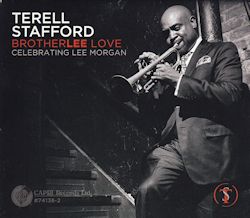-
Hocus Pocus
-
Mr Kenyatta
-
Petty Larceny
-
Candy
-
Yes I Can, No You Can't
-
Favor
-
Stop Start
-
Carolyn
-
Speedball
Terell Stafford - Trumpet
Tim Warfield - Saxophone
Bruce Barth - Piano
Peter Washington - Bass
Dana Hall - Drums
Philadelphia-born trumpet player Lee Morgan was perhaps best known for his 1964 hit (and his own composition), The Sidewinder, which
actually made the pop charts of the time. He met his death at the age of only 33, in February 1972, outside a night club in New York where he had
been performing. Following an altercation, a woman (variously described as a friend, acquaintance, common law or ex-wife, according to your source)
shot and killed him. Morgan as a musician divided opinion somewhat. The critic Whitney Balliett described him, after one performance in his early
days with Dizzy Gillespie's Big Band, as 'a young trumpeter who showed more technique than imagination'. That Morgan was no slouch is reflected in
the fact that he had no less than three separate spells with Art Blakey's Jazz Messengers. An early influence had been Clifford Brown but, before
his tragic demise, he had developed a highly individual style of his own. He was a sideman with Hank Mobley for a time and the tenor player was
another force for good in his growth as a musician. He also recorded a considerable number of discs under his own name.
All this is background to a new album, the title of which is both a homage to Philadelphia (translated, the name means 'city of brotherly love')
and an affectionate pun, BrotherLee Love, on Morgan's first name. The trumpeter Terell Stafford, appropriately enough, leads the group who
have made the recording. The CD features seven compositions by Lee Morgan plus Candy, a tune often identified with him, and a piece
written by Stafford which it must be said proves worthy to stand alongside Morgan's writing. Stafford, now 48, has had a long association with Tim
Warfield and Bruce Barth in particular among this group of musicians. The group can boast reputations built in big bands and small combos alike as
well as, in some cases, in the sphere of jazz education. Between them, they have produced a fitting tribute to a man Stafford dubs 'a total
genius'. If I had to put a label on the resulting music, I'd define it as 'East Coast' but that is probably too restrictive a description. There's
more going on here than simply a copy of a revered jazz tradition
Two examples of the disciplined ensemble work which is a consistent element of this recording can be found in the opening track, Hocus Pocus and in Favor. The latter, which is the sole Stafford composition, referred to above, is the longest track on the
album. That being so, it provides plenty of scope for the assembled talents to shine, whether it be Stafford's impassioned trumpet, Barth's punchy
piano licks, a bass that really takes it on (Washington) or that accomplished foil on tenor, the groovy Tim Warfield. For me, however, drummer Dana
Hall shows to best advantage on Yes I Can, No You Can't where his dynamism helps propel this jaunty number along nicely. Stop Start has another brisk and effective performance from him. Incidentally, with regard to Peter Washington, it's a joy to find a bass
player of this calibre given the space to express himself. Try, for instance, his exemplary performances on Petty Larceny, Candy
and Speedball. As for pianist Bruce Barth, he is on scintillating form on almost every track, though the ballad Candy probably
takes the prize. Both Stafford and Warfield are masters of mood and style, according to the demands of the piece they are playing. A particular
favourite for me was Carolyn, where Terell captures the beauty of this ballad perfectly, with Tim Warfield, dare I say it, smoochy in
support. The final track, Speedball, lives up to its name. There's a real sense of attack from all concerned. Swinging, at times
boisterous, this is straight-ahead jazz to savour.
Terell Stafford and his band are to be commended for this highly satisfying homage to Lee Morgan, someone who in his relatively short life
displayed his passion that his beloved jazz should receive the widest possible coverage in the media. I like to think the accessibility and
creativity of this disc would have pleased him.
James Poore
